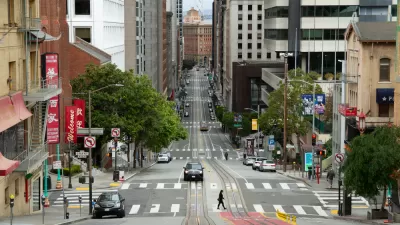The decrease in U.S. economic activity during the pandemic year of 2020 reduced the country's greenhouse gas emissions by 10.3 percent.

Rhodium Group has released its preliminary report on U.S. greenhouse gas emissions for 2020, estimating a dramatic decrease in emissions during the pandemic year.
Kate Larsen, Hannah Pitt, and Alfredo Rivera write an article for the Rhodium Group to explain the report's preliminary estimations, noting at the aperture that 2020 was an unusual year: limiting the spread of infection produced a historic shock to the U.S. economy and a 10.5 percent reduction in greenhouse gas emissions.
"That is the single largest drop in annual emissions in the post-World War II era, outpacing the Great Recession of 2009 when emissions dipped 6.3%," according to the article. The decline also lowers GHG emissions in the United States below 1990 levels for the first time. "With emissions down 21% below 2005 levels, this means the US is expected to far exceed its 2020 Copenhagen Accord target of a 17% reduction below 2005 levels."
The Paris Accords are intended to prevent economic collapse (by way of environmental collapse), so the writers caution against considering 2020 a down payment on the country's progress in meeting worldwide climate goals.
"With coronavirus vaccines now in distribution, we expect economic activity to pick up again in 2021, but without meaningful structural changes in the carbon intensity of the US economy, emissions will likely rise again as well."
The same report released in January 2020 found increased greenhouse gas emissions for the first time after three years of decline. In summer of 2020, Rhodium Group also released a report calculating the economic damage that achieved greenhouse gas emission reductions.
FULL STORY: Preliminary US Greenhouse Gas Emissions Estimates for 2020

Planetizen Federal Action Tracker
A weekly monitor of how Trump’s orders and actions are impacting planners and planning in America.

Chicago’s Ghost Rails
Just beneath the surface of the modern city lie the remnants of its expansive early 20th-century streetcar system.

San Antonio and Austin are Fusing Into one Massive Megaregion
The region spanning the two central Texas cities is growing fast, posing challenges for local infrastructure and water supplies.

Since Zion's Shuttles Went Electric “The Smog is Gone”
Visitors to Zion National Park can enjoy the canyon via the nation’s first fully electric park shuttle system.

Trump Distributing DOT Safety Funds at 1/10 Rate of Biden
Funds for Safe Streets and other transportation safety and equity programs are being held up by administrative reviews and conflicts with the Trump administration’s priorities.

German Cities Subsidize Taxis for Women Amid Wave of Violence
Free or low-cost taxi rides can help women navigate cities more safely, but critics say the programs don't address the root causes of violence against women.
Urban Design for Planners 1: Software Tools
This six-course series explores essential urban design concepts using open source software and equips planners with the tools they need to participate fully in the urban design process.
Planning for Universal Design
Learn the tools for implementing Universal Design in planning regulations.
planning NEXT
Appalachian Highlands Housing Partners
Mpact (founded as Rail~Volution)
City of Camden Redevelopment Agency
City of Astoria
City of Portland
City of Laramie





























